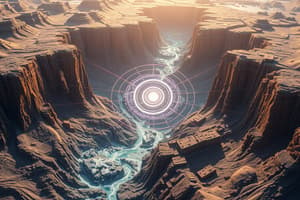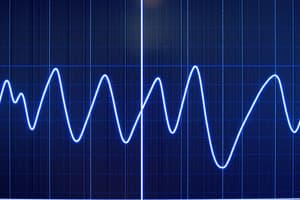Podcast
Questions and Answers
What is the secondary effect of an earthquake described as the collapse of buildings caused by earthquake vibrating water-saturated fill or unconsolidated soil?
What is the secondary effect of an earthquake described as the collapse of buildings caused by earthquake vibrating water-saturated fill or unconsolidated soil?
- Volcanic eruption
- Liquefaction (correct)
- Tsunami
- Landslide
What phenomenon is caused by a landslide or explosion under the oceans?
What phenomenon is caused by a landslide or explosion under the oceans?
- Earthquake
- Landslide-tsunami (correct)
- Volcanic eruption
- Tornado
Which of the following are intersecting lines used to help locate a specific place on a map?
Which of the following are intersecting lines used to help locate a specific place on a map?
- Tropics and Polar Circles
- Time zones
- Latitude and longitude (correct)
- Equator and Prime Meridian
Which of the following correctly describes the sound of a tsunami?
Which of the following correctly describes the sound of a tsunami?
Which of the following statements about tsunamis is incorrect?
Which of the following statements about tsunamis is incorrect?
What should be done if retreating ocean water is observed?
What should be done if retreating ocean water is observed?
What is the common indicator of an impending tsunami?
What is the common indicator of an impending tsunami?
What does SDC stand for?
What does SDC stand for?
If you experience any sign of a tsunami, you should:
If you experience any sign of a tsunami, you should:
What can you do to prepare for an earthquake if you are at risk?
What can you do to prepare for an earthquake if you are at risk?
What might happen when ground shaking results in breakage of gas, electrical lines and fuel lines, and overturning of stoves?
What might happen when ground shaking results in breakage of gas, electrical lines and fuel lines, and overturning of stoves?
Which of the following is NOT a cause of earthquakes?
Which of the following is NOT a cause of earthquakes?
Flashcards are hidden until you start studying
Study Notes
Earthquakes and Tsunamis
- The collapse of buildings caused by earthquake vibrating water-saturated fill or unconsolidated soil is a secondary effect of an earthquake known as liquefaction.
- Landslides or explosions under the ocean can cause tsunamis.
- Intersecting lines on a map can help locate a specific place.
Tsunami Characteristics
- A tsunami sounds like a train or a loud roar.
- Tsunamis can cause rapid changes in water level and unpredictable dangerous currents in harbors and ports.
- Tsunamis generated in distant locations may give people enough time to move to higher ground.
- Local tsunamis could strike some areas before a tsunami warning could be announced, leaving only a few minutes to move to higher ground.
Tsunami Safety
- If a tsunami warning is issued while at school, follow the advice of teachers and school personnel before making any move.
- If retreating ocean water is observed, watch for a sudden change in wave level.
Earthquake Hazard Reduction
- Building design and construction professionals use Seismic Design Categories (SDCs) specified in building codes to determine the level of seismic resistance required for new buildings.
- SDCs help reduce the risk of earthquakes.
Earthquake Preparedness
- To prepare for an earthquake, choose a safe place in every room of your house, such as sturdy tables or desks.
- During an earthquake, stay away from gas, electrical lines, and fuel lines, and avoid overturning stoves, which can lead to fires.
- When inside a building during an earthquake, do not call friends and relatives; instead, drop, cover, and hold on.
Earthquake Maps
- In an earthquake map, the strongest shaking is often represented by the color red.
Earthquake Risks
- Accurate data gathering, recording, and interpretation of ground shaking data are essential components of earthquake risk reduction.
- Careful analysis and interpretation of ground shaking data are necessary to reduce earthquake risks.
Community Resilience
- A community that has no earthquake preparedness measures in place will be most affected by an earthquake.
Studying That Suits You
Use AI to generate personalized quizzes and flashcards to suit your learning preferences.




